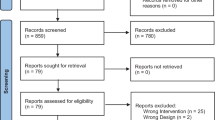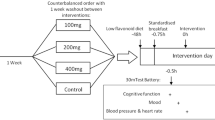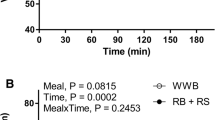Abstract
Past research indicates that dietary alterations involving increases in nuts or beetroot, or decreases in salt, may have the potential to enhance cognitive functioning. The current study reports cognitive outcomes from a 12-week randomized controlled parallel intervention trial designed to evaluate the effectiveness of manipulating these ingredients in a dietary staple, bread. Participants were recruited from Dunedin, New Zealand, between February 2015 and March 2017. Initial inclusion criteria required at least one indicator of metabolic syndrome and daily consumption of at least six slices of bread, but these criteria were relaxed 6 months into the study due to recruitment difficulties. In total, 196 participants were randomized (using minimization by age group, sex, and body mass index) to consume one of four breads (hazelnut, beetroot, low salt, or a control white bread). Participants completed a computerized cognitive test battery and physiological testing at four points during the intervention. Analyses focused on 102 participants (aged 18–73 years) who finished the intervention and completed pre- and post-intervention cognitive testing. Participants who consumed the experimental breads showed no evidence of cognitive improvement relative to the control group. Furthermore, the expected physiological changes did not occur, and participants reported poor compliance. Our findings suggest that participants may have changed their eating habits during the intervention period such that they consumed less bread and ingested other counteracting nutrients, rendering the intervention ineffective. Insight from this study can be used to guide the design of future dietary interventions.

Similar content being viewed by others
References
Afsar, B. (2013). The relationship between cognitive function, depressive behaviour and sleep quality with 24-h urinary sodium excretion in patients with essential hypertension. High Blood Pressure & Cardiovascular Prevention, 20(1), 19–24. https://doi.org/10.1007/s40292-013-0002-7.
Alfaro, F. J., Gavrieli, A., Saade-Lemus, P., Lioutas, V. A., Upadhyay, J., & Novak, V. (2018). White matter microstructure and cognitive decline in metabolic syndrome: a review of diffusion tensor imaging. Metabolism: Clinical and Experimental, 78, 52–68. https://doi.org/10.1016/j.metabol.2017.08.009.
Austin, B. P., Nair, V. A., Meier, T. B., Xu, G., Rowley, H. A., Carlsson, C. M., et al. (2011). Effects of hypoperfusion in Alzheimer’s disease. Journal of Alzheimer’s Disease, 26(Suppl 3), 123–133. https://doi.org/10.3233/JAD-2011-0010.
Bahaeddin, Z., Yans, A., Khodagholi, F., Hajimehdipoor, H., & Sahranavard, S. (2017). Hazelnut and neuroprotection: improved memory and hindered anxiety in response to intra-hippocampal Abeta injection. Nutritional Neuroscience, 20(6), 317–326. https://doi.org/10.1080/1028415X.2015.1126954.
Barbour, J. A., Howe, P. R., Buckley, J. D., Bryan, J., & Coates, A. M. (2014). Nut consumption for vascular health and cognitive function. Nutrition Research Reviews, 27(1), 131–158. https://doi.org/10.1017/S0954422414000079.
Barnham, K. J., Masters, C. L., & Bush, A. I. (2004). Neurodegenerative diseases and oxidative stress. Nature Reviews Drug Discovery, 3(3), 205–214. https://doi.org/10.1038/nrd1330.
Bolhuis, D. P., Temme, E. H., Koeman, F. T., Noort, M. W., Kremer, S., & Janssen, A. M. (2011). A salt reduction of 50% in bread does not decrease bread consumption or increase sodium intake by the choice of sandwich fillings. Journal of Nutrition, 141(12), 2249–2255. https://doi.org/10.3945/jn.111.141366.
Brainard, D. H. (1997). The psychophysics toolbox. Spatial Vision, 10(4), 433–436. https://doi.org/10.1163/156856897X00357.
Chisholm, A., Mc Auley, K., Mann, J., Williams, S., & Skeaff, M. (2005). Cholesterol lowering effects of nuts compared with a canola oil enriched cereal of similar fat composition. Nutrition, Metabolism, and Cardiovascular Diseases, 15(4), 284–292. https://doi.org/10.1016/j.numecd.2005.01.006.
Chugh, G., Asghar, M., Patki, G., Bohat, R., Jafri, F., Allam, F., et al. (2013). A high-salt diet further impairs age-associated declines in cognitive, behavioral, and cardiovascular functions in male Fischer brown Norway rats. Journal of Nutrition, 143(9), 1406–1413. https://doi.org/10.3945/jn.113.177980.
Corsi, P. M. (1972). Human memory and the medial temporal region of the brain. Dissertation Abstracts International, 34, 819B.
Cutler, J. A., Follmann, D., & Allender, P. S. (1997). Randomized trials of sodium reduction: An overview. American Journal of Clinical Nutrition, 65(2 Suppl), 643S–651S. https://doi.org/10.1093/ajcn/65.2.643S.
Devi, A., Chisholm, A., Gray, A., Tey, S. L., Williamson-Poutama, D., Cameron, S. L., & Brown, R. C. (2015). Nut-enriched bread is an effective and acceptable vehicle to improve regular nut consumption. European Journal of Nutrition. https://doi.org/10.1007/s00394-015-1038-3.
Fiocco, A. J., Shatenstein, B., Ferland, G., Payette, H., Belleville, S., Kergoat, M. J., et al. (2012). Sodium intake and physical activity impact cognitive maintenance in older adults: The NuAge study. Neurobiology of Aging, 33(4), 829 e821–829 e828. https://doi.org/10.1016/j.neurobiolaging.2011.07.004.
Folstein, M. F., Folstein, S. E., & McHugh, P. R. (1975). “mini-mental state”. A practical method for grading the cognitive state of patients for the clinician. Journal of Psychiatric Research, 12(3), 189–198. https://doi.org/10.1016/0022-3956(75)90026-6.
Forsyth, B., Machado, L., Jowett, T., Jakobi, H., Garbe, K., Winter, H., & Glue, P. (2016). Effects of low dose ibogaine on subjective mood state and psychological performance. Journal of Ethnopharmacology, 189, 10–13. https://doi.org/10.1016/j.jep.2016.05.022.
Gilchrist, M., Winyard, P. G., Fulford, J., Anning, C., Shore, A. C., & Benjamin, N. (2014). Dietary nitrate supplementation improves reaction time in type 2 diabetes: development and application of a novel nitrate-depleted beetroot juice placebo. Nitric Oxide, 40, 67–74. https://doi.org/10.1016/j.niox.2014.05.003.
Gomez-Pinilla, F. (2008). Brain foods: the effects of nutrients on brain function. Nature Reviews: Neuroscience, 9(7), 568–578. https://doi.org/10.1038/nrn2421.
Haring, B., Wu, C., Coker, L. H., Seth, A., Snetselaar, L., Manson, J. E., et al. (2016). Hypertension, dietary sodium, and cognitive decline: results from the Women’s Health Initiative memory study. American Journal of Hypertension, 29(2), 202–216. https://doi.org/10.1093/ajh/hpv081.
He, F. J., & MacGregor, G. A. (2002). Effect of modest salt reduction on blood pressure: a meta-analysis of randomized trials. Implications for public health. Journal of Human Hypertension, 16(11), 761–770. https://doi.org/10.1038/sj.jhh.1001459.
Hobbs, D. A., Kaffa, N., George, T. W., Methven, L., & Lovegrove, J. A. (2012). Blood pressure-lowering effects of beetroot juice and novel beetroot-enriched bread products in normotensive male subjects. British Journal of Nutrition, 108(11), 2066–2074. https://doi.org/10.1017/S0007114512000190.
Hobbs, D. A., Goulding, M. G., Nguyen, A., Malaver, T., Walker, C. F., George, T. W., et al. (2013). Acute ingestion of beetroot bread increases endothelium-independent vasodilation and lowers diastolic blood pressure in healthy men: a randomized controlled trial. Journal of Nutrition, 143(9), 1399–1405. https://doi.org/10.3945/jn.113.175778.
Iadecola, C., Yaffe, K., Biller, J., Bratzke, L. C., Faraci, F. M., Gorelick, P. B., et al. (2016). Impact of hypertension on cognitive function: a scientific statement from the American Heart Association. Hypertension, 68(6), e67–e94. https://doi.org/10.1161/HYP.0000000000000053.
Kelly, J., Fulford, J., Vanhatalo, A., Blackwell, J. R., French, O., Bailey, S. J., et al. (2013). Effects of short-term dietary nitrate supplementation on blood pressure, O2 uptake kinetics, and muscle and cognitive function in older adults. American Journal of Physiology: Regulatory, Integrative and Comparative Physiology, 304(2), R73–R83. https://doi.org/10.1152/ajpregu.00406.2012.
Kessels, R. P., van Zandvoort, M. J., Postma, A., Kappelle, L. J., & de Haan, E. H. (2000). The Corsi block-tapping task: standardization and normative data. Applied Neuropsychology, 7(4), 252–258. https://doi.org/10.1207/S15324826AN0704_8.
Lidder, S., & Webb, A. J. (2013). Vascular effects of dietary nitrate (as found in green leafy vegetables and beetroot) via the nitrate-nitrite-nitric oxide pathway. British Journal of Clinical Pharmacology, 75(3), 677–696. https://doi.org/10.1111/j.1365-2125.2012.04420.x.
Liu, Y. Z., Chen, J. K., Li, Z. P., Zhao, T., Ni, M., Li, D. J., et al. (2014). High-salt diet enhances hippocampal oxidative stress and cognitive impairment in mice. Neurobiology of Learning and Memory, 114, 10–15. https://doi.org/10.1016/j.nlm.2014.04.010.
McMahon, E., Clarke, R., Jaenke, R., & Brimblecombe, J. (2016). Detection of 12.5% and 25% salt reduction in bread in a remote indigenous Australian community. Nutrients, 8(3), 169. https://doi.org/10.3390/nu8030169.
Nooyens, A. C., Bueno-de-Mesquita, H. B., van Boxtel, M. P., van Gelder, B. M., Verhagen, H., & Verschuren, W. M. (2011). Fruit and vegetable intake and cognitive decline in middle-aged men and women: the Doetinchem cohort study. British Journal of Nutrition, 106(5), 752–761. https://doi.org/10.1017/S0007114511001024.
Ozemek, C., Phillips, S. A., Popovic, D., Laddu-Patel, D., Fancher, I. S., Arena, R., & Lavie, C. J. (2017). Nonpharmacologic management of hypertension: a multidisciplinary approach. Current Opinion in Cardiology, 32(4), 381–388. https://doi.org/10.1097/HCO.0000000000000406.
Pelli, D. G. (1997). The VideoToolbox software for visual psychophysics: transforming numbers into movies. Spatial Vision, 10(4), 437–442. https://doi.org/10.1163/156856897X00366.
Poulet, R., Gentile, M. T., Vecchione, C., Distaso, M., Aretini, A., Fratta, L., et al. (2006). Acute hypertension induces oxidative stress in brain tissues. Journal of Cerebral Blood Flow and Metabolism, 26(2), 253–262. https://doi.org/10.1038/sj.jcbfm.9600188.
Poulose, S. M., Miller, M. G., & Shukitt-Hale, B. (2014). Role of walnuts in maintaining brain health with age. Journal of Nutrition, 144(4 Suppl), 561S–566S. https://doi.org/10.3945/jn.113.184838.
Presley, T. D., Morgan, A. R., Bechtold, E., Clodfelter, W., Dove, R. W., Jennings, J. M., et al. (2011). Acute effect of a high nitrate diet on brain perfusion in older adults. Nitric Oxide, 24(1), 34–42. https://doi.org/10.1016/j.niox.2010.10.002.
Pribis, P., & Shukitt-Hale, B. (2014). Cognition: the new frontier for nuts and berries. American Journal of Clinical Nutrition, 100(Supplement 1), 347S–352S. https://doi.org/10.3945/ajcn.113.071506.
Pribis, P., Bailey, R. N., Russell, A. A., Kilsby, M. A., Hernandez, M., Craig, W. J., et al. (2012). Effects of walnut consumption on cognitive performance in young adults. British Journal of Nutrition, 107(9), 1393–1401. https://doi.org/10.1017/S0007114511004302.
Siervo, M., Lara, J., Ogbonmwan, I., & Mathers, J. C. (2013). Inorganic nitrate and beetroot juice supplementation reduces blood pressure in adults: a systematic review and meta-analysis. Journal of Nutrition, 143(6), 818–826. https://doi.org/10.3945/jn.112.170233.
Tanaka, T., Okamura, T., Miura, K., Kadowaki, T., Ueshima, H., Nakagawa, H., & Hashimoto, T. (2002). A simple method to estimate populational 24-h urinary sodium and potassium excretion using a casual urine specimen. Journal of Human Hypertension, 16(2), 97–103. https://doi.org/10.1038/sj.jhh.1001307.
Tey, S. L., Brown, R. C., Chisholm, A. W., Delahunty, C. M., Gray, A. R., & Williams, S. M. (2011). Effects of different forms of hazelnuts on blood lipids and α-tocopherol concentrations in mildly hypercholesterolemic individuals. European Journal of Clinical Nutrition, 65(1), 117–124. https://doi.org/10.1038/ejcn.2010.200.
Tey, S. L., Brown, R. C., & Chisholm, A. W. (2012). Nuts and heart health. National heart foundation of New Zealand evidence-based position statement on the relationship of nuts to heart health. Auckland: National Heart Foundation of New Zealand.
Thompson, K. G., Turner, L., Prichard, J., Dodd, F., Kennedy, D. O., Haskell, C., et al. (2014). Influence of dietary nitrate supplementation on physiological and cognitive responses to incremental cycle exercise. Respiratory Physiology & Neurobiology, 193, 11–20. https://doi.org/10.1016/j.resp.2013.12.015.
Thompson, C., Wylie, L. J., Fulford, J., Kelly, J., Black, M. I., McDonagh, S. T., et al. (2015). Dietary nitrate improves sprint performance and cognitive function during prolonged intermittent exercise. European Journal of Applied Physiology, 115(9), 1825–1834. https://doi.org/10.1007/s00421-015-3166-0.
Thurnham, D. I., Smith, E., & Flora, P. S. (1988). Concurrent liquid-chromatographic assay of retinol, alpha-tocopherol, beta-carotene, alpha-carotene, lycopene, and beta-cryptoxanthin in plasma, with tocopherol acetate as internal standard. Clinical Chemistry, 34(2), 377–381.
University of Otago and Ministry of Health. (2011). A focus on nutrition: Key findings of the 2008/09 New Zealand adult nutrition survey. Wellington: Ministry of Health Retrieved from http://www.health.govt.nz/system/files/documents/publications/a-focus-on-nutrition-v2.pdf.
Webb, A. J., Patel, N., Loukogeorgakis, S., Okorie, M., Aboud, Z., Misra, S., et al. (2008). Acute blood pressure lowering, vasoprotective, and antiplatelet properties of dietary nitrate via bioconversion to nitrite. Hypertension, 51(3), 784–790. https://doi.org/10.1161/HYPERTENSIONAHA.107.103523.
Wengreen, H., Munger, R. G., Cutler, A., Quach, A., Bowles, A., Corcoran, C., et al. (2013). Prospective study of dietary approaches to stop hypertension- and Mediterranean-style dietary patterns and age-related cognitive change: the Cache County study on memory, health and aging. American Journal of Clinical Nutrition, 98(5), 1263–1271. https://doi.org/10.3945/ajcn.112.051276.
White, N., Forsyth, B., Lee, A., & Machado, L. (2018). Repeated computerized cognitive testing: performance shifts and test-retest reliability in healthy young adults. Psychological Assessment, 30(4), 539–549. https://doi.org/10.1037/pas0000503.
White, N., Flannery, L., McClintock, A., & Machado, L. (2019). Repeated computerized cognitive testing: performance shifts and test-retest reliability in healthy older adults. Journal of Clinical and Experimental Neuropsychology, 41(2), 179–191. https://doi.org/10.1080/13803395.2018.1526888.
Wightman, E. L., Haskell-Ramsay, C. F., Thompson, K. G., Blackwell, J. R., Winyard, P. G., Forster, J., et al. (2015). Dietary nitrate modulates cerebral blood flow parameters and cognitive performance in humans: a double-blind, placebo-controlled, crossover investigation. Physiology and Behavior, 149, 149–158. https://doi.org/10.1016/j.physbeh.2015.05.035.
Woodward, E., Eyles, H., & Ni Mhurchu, C. (2012). Key opportunities for sodium reduction in New Zealand processed foods. Australian and New Zealand Journal of Public Health, 36(1), 84–89. https://doi.org/10.1111/j.1753-6405.2012.00829.x.
Acknowledgments
The authors thank Georgia Best, Kirstin Bierre, Georgia Cowan, Stephanie Glover, Chris Gorman, Grace Killmer, Saejung Oh, Laura Thompson, Scott van Heerden, and the Human Nutrition team for their assistance with this project.
Funding
This research was supported by a Health Research Council of New Zealand Emerging Researcher First Grant awarded to Katherine Black (#14/581), and a Neurological Foundation of New Zealand Small Project Grant (#1537-SPG) awarded to Liana Machado.
Author information
Authors and Affiliations
Corresponding author
Ethics declarations
Conflict of Interest
The authors declare that they have no conflict of interest.
Additional information
Publisher’s Note
Springer Nature remains neutral with regard to jurisdictional claims in published maps and institutional affiliations.
Electronic supplementary material
Table S1
(DOCX 16 kb)
Rights and permissions
About this article
Cite this article
White, N., Naldoza-Drake, P., Black, K. et al. Can Improving the Nutritional Content of Bread Enhance Cognition? Cognitive Outcomes from a Randomized Controlled Trial. J Cogn Enhanc 4, 167–178 (2020). https://doi.org/10.1007/s41465-019-00149-0
Received:
Accepted:
Published:
Issue Date:
DOI: https://doi.org/10.1007/s41465-019-00149-0




